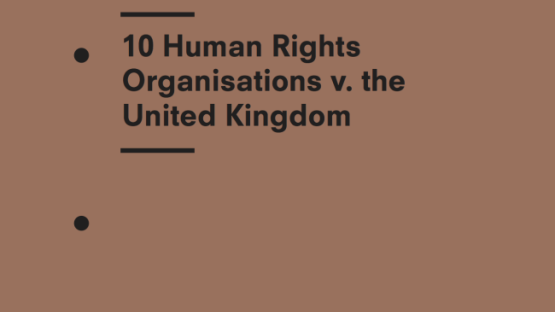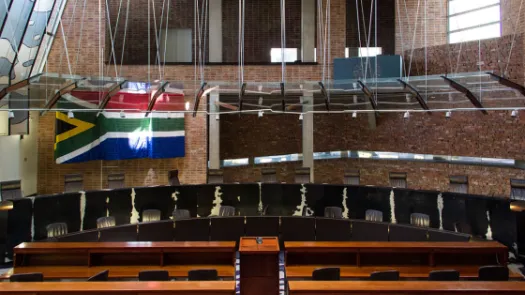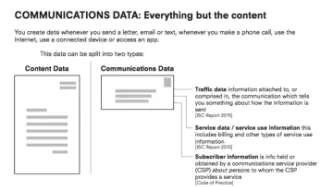Recap: 10 Human Rights Organisations vs. The United Kingdom

For further information on timeline and case history, read this briefing.
Arguments
The argument were based on the written submissions of the parties. The oral statements summarised key points in these submissions.
The submissions can be found on PI’s website under Legal Action. In terms of today’s proceedings (these are now available through webcast)
Counsel for the UK Government, James Eadie QC started off proceedings, his opening arguments were: 1) The issues are of the utmost importance as if the applicants arguments are accepted this would do profound damage to the work of UIS and that the ability of UKIS to protect needs to be taken into account. Whilst privacy is importance, the right to life and safety of citizens is paramount. The Anderson Report, affirms the vital utility of these powers; 2) Non-targeted bulk surveillance is critical for discovery of threats, i.e. small pieces that allow UKIS to identify new threats. Eadie referred to IPT judgment 2 months ago re BPD/BCD; 3) In a national security context, if the procedural requirements proposed by the applicants were applied to bulk measures this would frustrate and put at risk national security of the UK and other members states.
The Government called on the Court to declare the applications inadmissible or on the merits, find no violation of ECHR.
Counsel for the applicants Dinah Rose QC then set out the case in terms of violations of Articles 8, 10, 6 and 14 of ECHR. Counsel emphasised the complex and opaque nature of RIPA. Counsel ran through, the UK’s history of breaches of Article 8, the rapid technical change, and acknowledged security threats but highlighted that proper safeguards don’t jeopardise national security and that other states such as Germany have safeguards.
The bulk interception regime is not in accordance with the law, it is no accessible and forseeable, s8(4) provides broad powers exercised in a secret manner and lacks minimum safeguards identified by ECtHR in the case of Weber and given vastly increased capabilities since that case, enhanced safeguards identified by the Court in more recent cases should be applied — that is prior independent judicial authorisation, objective evidence of reasonable suspicion and notification after the event. Counsel explained the deficiencies in the RIPA regime and how the practices interfere with the right to privacy, the right to freedom of expression (through identification of journalist/ human rights NGO sources) and the secretive practices of the IPT, with the right to a fair trial in Article 6.
Helen Mountfield QC for the applicants, then went on to set out the applicants arguments in terms of intelligence sharing and the lack of safeguards that apply to material intercepted by foreign intelligence services and accessed by the UK, which provides a route by which to circumvent the limited safeguards of RIPA.
The applicants called on the Court to find violations of Articles 8, 10, 14 and 6 of ECHR.
Questions Asked
The judges asked a number of questions, some of which were specifically directed at the Government.
The questions mainly covered the warrant procedure under 8(4) of RIPA and the safeguards in place, including the type of material, how material is filtered (who has control of selectors/ search terms), review/ renewal of warrants, retention, and oversight. There were also some questions regarding the IPT, the extent to which the Court could take into account the IP Act 2016 and the application of safeguards to material from foreign governments.
Questions included:
- Who controls the activation of the interception facility i.e. enables bulk interception when there is a warrant in place?
- How does bulk interception apply to documents/ images stored on cloud services?
- Can the Government confirm, refute, comments on the allegation that there is a rolling warrant programme?
- Who is in charge of determining the criteria (selectors/ search terms) used to analysis the intercepted data?
- What are the safeguards to ensure that data not selected for examination is not then used for analysis and identifying communication patterns of interest to UKIS?
- Is it possible for a Commissioner to conduct an ex post review of filtering criteria/ is anybody empowered to issue binding instructions or orders in this regard?
- Is it possible for the Government to expand upon safeguards to limit retention?
- Given safeguards in s16 of RIPA, don’t apply to communications data and it has been asserted by the UK Gov that without looking at communications data difficult to know whether an individual is in the UK, then why is more than basic transfer data needed and what safeguards are there to made sure other information (subscriber/ user information) is discarded?
- Can the Government clarify the application of paras 4.8–4.21 in the Code of Practice to confidential journalistic material, despite the distinction in para 4.6.
- Can the parties confirm that argument re s22/ Ch2 of RIPA continues to be pursued.
- How can indefinite retention of data be justified?
- Are all connections under surveillance?
- If a warrant is issued for national security purposes is it later reviewed for other purpose?
- Is the economic well being condition in accordance with ECHR?
- To what extent can the Court take into account the new legislative framework? (i.e. IP Act 2016)
- Ch. 12 of the Code of Practice and the application of safeguards to intercept from foreign governments.
Was Any New Information Discussed?
No. It was principally and articulation of arguments set out in written submissions before the ECtHR.
Our Reflections On the Hearing
The hearing today was the cumulation of a long process, which began in the IPT in 2013, months after the Snowden disclosures. The hearing was therefore a very important moment to bring the issues with bulk interception and access to bulk intercept communications of foreign intelligence agencies to the Court’s attention. Our counsel put forward strong arguments as to why these practices are in breach of Articles 6, 8, 10 and 14 of ECHR and we look forward to receiving the Court’s judgment.
Is There A Timeline For the Judgement?
No. Parties will be informed in due course of the date of the judgement.



